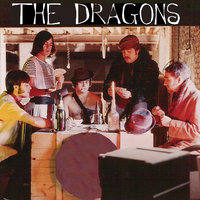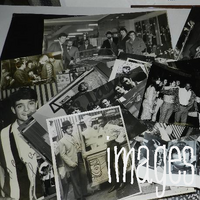
The Dragons
The Dragons was a Brunanter rock band formed in Grijzestad and most famous in the late 1960s and 1970s. The Dragons were one of the earliest rock groups in Brunant and were the most successful and prolific.
History[]
Early years[]
The Dragons were formed in 1967 by Grijzestad University students, led by Dennis Neyt. Neyt was the guitarist, Martin De Clerk was the bassist and lead singer, Cris Heemskerk was the keyboardist, Sebastian Collins was second guitarist and Richard Hout was the drummer. They played a number of venues in the city, most famously the seedy and disreputable Bari. After encouraging performances at local bars and venues they decided to devote their time to music, dropping out of school. They were signed on to local label Sterren Muziek and in 1968 they released the EP Een Misterie, which became a moderate hit locally but a failure nationally. The group nearly split up over the relative failure of the EP.
The largely unknown band even managed a Hit Parade 20 hit with their single Victoria in 1969.
In 1969 the band, with further recognition already gave concerts in Koningstad and Roodstad, though at the moment they were still more popular among their Dutch-speaking fans. A full album, Olifanten, was released in 1969. It is noted for being Myrthe Loncke's first record, as she provided backing vocals on the songs "Maan" and "Mooie Lach".
Vijf, Buiten Kijf![]
The band soon caught the interest of Grijzestad based film company Cactus Pictures, who wanted to bank in on the string of hit films and shows on Rock groups. The film Vijf, Buiten Kijf! (Five, No Doubt!) was filmed throughout 1969 and released early December 1969. Together with the film soundtrack (Vijf, Buiten Kijf!) being released, the group quickly shot to stardom, despite having limited English-language releases.
Their 1970 release Wij Vijf followed up on the success of their film, with plans for an album in 1971 scrapped due to busy schedules. Live and Alive was released in 1972, a live recording of new songs.
The Dragons[]

1976 Lovian tour poster
The band increasingly took on a harder sound, much more than Vijf, Buiten Kijf!, which was already considered hard rock in Brunant. There were some disagreements within the band, with guitarist Sebastian Collins wanting a more creative role with the music and some connection with their original pop-rock music. He and Neyt clashed, especially as the latter began recording lots of English-language songs. Collins was able to get some of the songs he penned in the early years on their 1972 concert at University Park and the subsequent live album.
Work on a new album went by slowly, with Collins unhappy with the harder sound of their album. In January 1973 Collins left the group and was replaced in May with Gerard De Meer[1] The album was titled The Dragons, and it would prove to be the seminal album in the progressive rock scene, later popularized by Torqy Donaldson and Black Sheep. Again Neyt had most of the creative input, with De Clerk being quoted as saying he "could be just as creative as [Neyt] if given the chance".
Wednesday's Wine[]
Wednesday's Wine in 1975 further cemented the group into the prog rock style, with De Clerk taking on a more creative role in this one. The group embarked on a concert tour following its release, including to Lovia in April 1976. This led to much disagreement and conflict within the band, further causing strain between members. They were scheduled to do three concerts in San Francisco and three in Lovia, but Neyt and De Clerk fought over those, with Neyt saying the concerts were <<too much, too taxing and do nothing for our image>>. Nevertheless they performed the concerts on 1, 2 and 3 April. Electrical problems dogged the first night, with a sound technician being knocked out by Heemskerk in a heated argument. The second night was trouble-free, but on the third Neyt left partway through the show and refused to return to the stage.
The group left for Lovia without Neyt, and it was there where drummer Richard Hout quit the band, later stating that the antics and petty conflict had gone on too far and that he was by nature marginalized. Local drummer Greg Bates filled in during the tour alongside De Clerk, Heemskerk and De Meer.
Upon the return to Brunant, the band unofficially broke up.
The House of Mime[]
De Clerk, Heemskerk and De Meer reunited in 1978 with the thought of performing at the upcoming edition of the Pinkpop Festival in the Netherlands. Richard Hout was persuaded to join them in 1979, recording some material written by De Clerk. The group was unable to perform in the festival but ended up with enough material for an album.
At some point in 1979 or early 1980, Dennis Neyt rejoined the band, financing a concert tour and the actual release of the album, as the band's contract with Stereophone ended.
The House of Mime was released in May 1980, with 1500 copies produced under the "Draken" label created by Neyt. Shortly after a deal was agreed with Vogue, and they produced a further 5000 initial copies. The album, in a prog rock style but incorporating newer pop-rock styles did not sell as well as their last album, but was popular enough to cement the reunited band.
The Camel[]
The group was slow in recording new material for Vogue, as Neyt was focused on ideas for a new sound and direction despite apparently nothing being produced to the rest of the group. He became somewhat detached, living in a hotel in Koningstad as he had sold his home. Martin De Clerk presented some songs for the band to practice, but Neyt derided them as old fashioned. Some time in late 1982 he announced a new-wave inspired concept album, centered around a new track he had written, titled "Plastic Fantastic", which eventually totaled 9 minutes in length.
Martin De Clerk disagreed with the direction and adamantly wanted his songs in the album. He contributed to one piece which was reworked by Neyt into his "Flat Lands" composition. De Clerk was not happy and quit the band in early 1983. Neyt managed to keep the group together as he finished composing the album, in which he eventually sung lead in most of the songs.
Released in July 1983, it was not a major success, with the lead single of "Plastic Fantastic" (even at a reduced 6 minutes) performing below par. The album eventually sold 38.000 copies, much less than imagined and led the group to break up again.
Images[]
In the late 1980s Neyt attempted to re-establish the group, enlisting Welsh bassist David Lemmon for a new Dragons. Eventually Gerard De Meer and Richard Hout rejoined the planned group in 1990; Cris Heemskerk no longer wanted any part of the band and and Martin De Clerk attempted but was unable to prevent the use of the name and refused any part of this band.
The album sold well but was derided by the members as "poor work". Despite that there was much interest for concerts and the group spent many years on several tours, giving concerts and performing televised shows. A 25th anniversary concert took place on 2 May 1993, with Neyt, Hout, Lemmon and Geert Hopp (formerly of Black Sheep, in place of De Meer). Lemmon left the band shortly afterward. A "studio TV special" was produced for TV Plus in early 1994. De Meer soon grew tired of touring, and coupled with hip and other medical issues, took a hiatus from performing in late 1994. Hopp rejoined the band in early 1994 to perform when De Meer was away, but as the year progressed even played alongside him until his departure; Hopp then took his place in the band by mid-year.
Mirror Image[]
Eventually Neyt began work on writing songs for a subsequent album in 1996, together with David Lemmon, to be titled Mirror Image. This was the first time in over 20 years someone other than the well-known Neyt/De Clerk duo would have writing credits on the album. Canadian keyboardist Gregg Dechert joined the band for studio recordings, and performed in one concert in early 1997. The album was a continuation of their 1991 album's storyline, but with a slightly different musical sound.
During the production of Mirror Image, there was discussion from Stereophone in a 30th anniversary tour, or at least a concert with original and founding members (ie. De Clerk, Heemskerk or even Collins). Neyt was opposed to Heemskerk or Collins rejoining, though De Clerk was not opposed. Most of the band seemed favorable to a concert or even tour and Neyt made it clear once the album was produced he was leaving, quitting in May that year
Eventually the group disbanded in August 1997. Stereophone still had hopes for a reunion concert, and in May 1998 De Clerk, Hout, Heemskerk, plus Hopp and Lemmon were persuaded to perform several concerts in the summer. Hout left the band after two performances and it soon became clear that the band would dissolve after the concerts were completed. Drummer John Fancy (later of Run Run She Does) was involved for the remaining concerts in lieu of Hout.
De Rivier[]
Some resurgence in interest of the band took place following the release of Their Greatest Hits, a compilation album made in 2008.
De Clerk joined with Hopp, Lemmon and Fancy in 2010 for a private benefit concert for the Haitian earthquake victims. Interest was yet again renewed for a new re-formed band, but De Clerk was unsure and Dennis Neyt began showing interest instead. In May 2014 a lineup of Neyt, Lemmon and Traspesian drummer Manolo Hernández was announced to perform for the Donderstad Festival. In the fall, Robert Harding (formerly of Trampled) joined the band as a second guitarist and vocalist. Work on an entirely new sound began and Neyt began producing a new album incorporating drone/minimalist sounds and reduced vocals. De Rivier was released in May 2015 to mixed reviews but moderate sales. In July that year, Cris Heemskerk died at the age of 69, and was praised by current and former band members.
In Steen Gebeiteld (In Stone)[]
Neyt and Lemmon then embarked on an album project for the band's 50th anniversary, which would be comprised of modern recordings of the band's many hits. None of the songs written by or with Sebastian Collins were included and the album focused on re-recording of three distinct periods: 1973-1975, the early 1980s and the 1990s. Geert Hopp and John Fancy briefly rejoined the band for studio recordings and some concert appearances, while Martin De Clerk was invited by Neyt to record in the studio with them, but did not re-join the band, instead simply recording with them. Libertan bassist Franky Dee Paige also joined the group in the studio. In Steen Gebeiteld (In Stone) was released in November 2017. The cover featured the band together in 1969; Collins complained about his picture being on the cover but ultimately his opposition was rescinded.
After the album was released, David Lemmon announced his retirement from the band and Paige took over his spot with the group.
Members[]

Discography[]
- Wij Vijf (1970 EP)
Notes[]
- ↑ Collins would later join Lovian rock band The Coasters.













